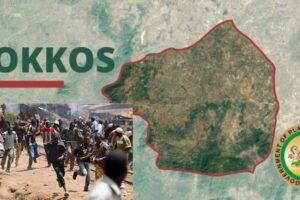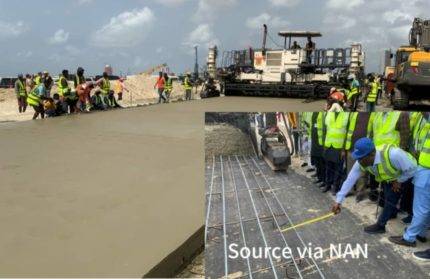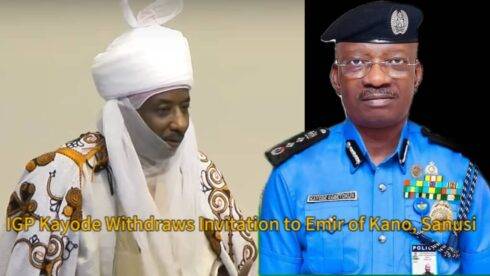The Minister of Works, Sen. Dave Umahi, has announced that he received a directive from President Tinubu for the prompt design of the Sokoto-Badagry Coastal Highway. This directive marks a pivotal step towards realizing the ambitious coastal road project, which is poised to transform transportation networks across the country.
Speaking after his inspection of Section one, phase one, of the Lagos-Calabar Coastal Highway and its realignment in Lagos, Mr. Umahi expressed his satisfaction with the progress made thus far. He reiterated the importance of the coastal highway project in fostering economic growth, regional integration, and social development across Nigeria. The Minister’s remarks underscore the government’s commitment to infrastructure development as a cornerstone of its agenda for national progress.
The Sokoto-Badagry Coastal Highway, spanning approximately 1000 kilometers, is set to serve as a crucial artery linking the regions of Nigeria from the South-West to the South-South, North-East, North-West, and North-Central. This strategic infrastructure project holds immense potential for facilitating trade, tourism, and transportation, thereby catalyzing socio-economic development in the country. As preparations for the design phase gain momentum, stakeholders eagerly anticipate the tangible benefits that the coastal road will bring to communities and businesses along its route.
Expanding Connectivity: Spurring Economic Growth
The directive to commence the immediate design of the Sokoto-Badagry Coastal Highway heralds a new era of connectivity and accessibility for Nigeria. By integrating various regions of the country through a comprehensive road network, the government aims to unlock vast economic potential and stimulate growth across multiple sectors. The coastal highway project is envisioned as more than just a transportation route; it is a catalyst for sustainable development, fostering trade, investment, and job creation along its path.
The significance of the Sokoto-Badagry Coastal Highway extends beyond its physical infrastructure. It represents a bold vision for a more integrated and interconnected Nigeria, where goods, services, and people can move freely across vast distances. As the design phase progresses, careful consideration must be given to environmental sustainability, social inclusivity, and economic viability. Engaging local communities, leveraging technological innovations, and adhering to best practices in infrastructure development will be essential to realizing the full potential of this transformative project.
Towards National Integration: Linking Communities
At its core, the Sokoto-Badagry Coastal Highway embodies the spirit of national unity and integration. By bridging geographical divides and connecting diverse regions, the coastal road promises to foster greater cohesion and collaboration among Nigeria’s various communities. The project’s scope extends beyond mere infrastructure; it is a symbol of the government’s commitment to fostering inclusivity, equality, and prosperity for all citizens.
As the design process unfolds, it is imperative to prioritize stakeholder engagement and consultation to ensure that the Sokoto-Badagry Coastal Highway meets the needs and aspirations of the people it serves. Collaboration between government agencies, private sector partners, and local communities will be key to overcoming challenges and maximizing the benefits of this monumental undertaking. Ultimately, the successful implementation of the coastal road project will not only enhance connectivity but also strengthen the bonds of unity and solidarity that bind Nigeria together as a nation.
Transformative Impact on Economic Landscape of Sokoto-Badagry Coastal Highway
The unveiling of the Sokoto-Badagry Coastal Highway project signals a paradigm shift in Nigeria’s infrastructure development agenda, with a keen focus on coastal roads spanning various regions of the country. Umahi emphasized the direct economic benefits that would accrue from these initiatives, ranging from attracting foreign investors to fostering the growth of local businesses and enhancing the country’s Gross Domestic Product (GDP).
Moreover, the Minister underscored the significance of reclaiming government lands and shorelines along the federal government gazetted right-of-way, signaling a commitment to ensuring efficient land use and management. By addressing encroachments and enforcing regulatory measures, the government aims to safeguard critical infrastructure projects and optimize their socio-economic impact.
As Nigeria charts a course towards sustainable economic growth and diversification, strategic infrastructure investments such as the Sokoto-Badagry Coastal Highway project are poised to play a pivotal role in unlocking the nation’s vast potential. With a clear emphasis on enhancing connectivity, promoting trade, and attracting investments, President Tinubu’s administration is laying the groundwork for a more resilient and prosperous future for all Nigerians.
Table of Contents
Discover more from OGM News NG
Subscribe to get the latest posts sent to your email.














